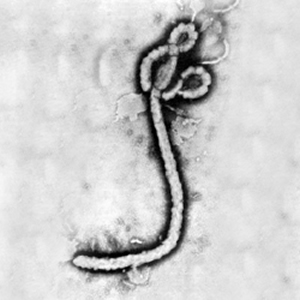Teixobactin
The development of new antibiotics has been a difficult task due to the rapid evolution of resistant bacteria. Teixobactin is a newly discovered antibiotic that is effective against gram positive bacteria including antibiotic-resistant strains, such as methicilin-resistant Staphylococcus aureus (MRSA) and vancomycin-resistant enterococci (VRE), without evidence of resistance development.1 The antibiotic, isolated from the soil using a device called the iChip, works by inhibiting cell wall synthesis.1
Introduction
At right is a sample image insertion. It works for any image uploaded anywhere to MicrobeWiki. The insertion code consists of:
Double brackets: [[
Filename: Ebola virus 1.jpeg
Thumbnail status: |thumb|
Pixel size: |300px|
Placement on page: |right|
Legend/credit: Electron micrograph of the Ebola Zaire virus. This was the first photo ever taken of the virus, on 10/13/1976. By Dr. F.A. Murphy, now at U.C. Davis, then at the CDC.
Closed double brackets: ]]
Other examples:
Bold
Italic
Subscript: H2O
Superscript: Fe3+
Overall paper length should be 3,000 words, with at least 3 figures with data.
Identification
Teixobactin was isolated from Eleftheria terrae from soil using a high-throughput device called the iChip.1 The iChip is used to isolate previously unculturable bacteria by growing microbes in situ in hundreds of miniature diffusible chambers on the iChip where their normal environmental factors could be used to cultivate the bacteria.2 Microbes isolated through iChip where identified through 16S rRNA gene sequences, finding organisms that were not previously cultivatable.
Resistance and Mechanism of Action
Include some current research in each topic, with at least one figure showing data.
Efficacy
Include some current research in each topic, with at least one figure showing data.
Further Reading
[Sample link] Ebola Hemorrhagic Fever—Centers for Disease Control and Prevention, Special Pathogens Branch
References
Edited by (your name here), a student of Nora Sullivan in BIOL168L (Microbiology) in The Keck Science Department of the Claremont Colleges Spring 2014.

